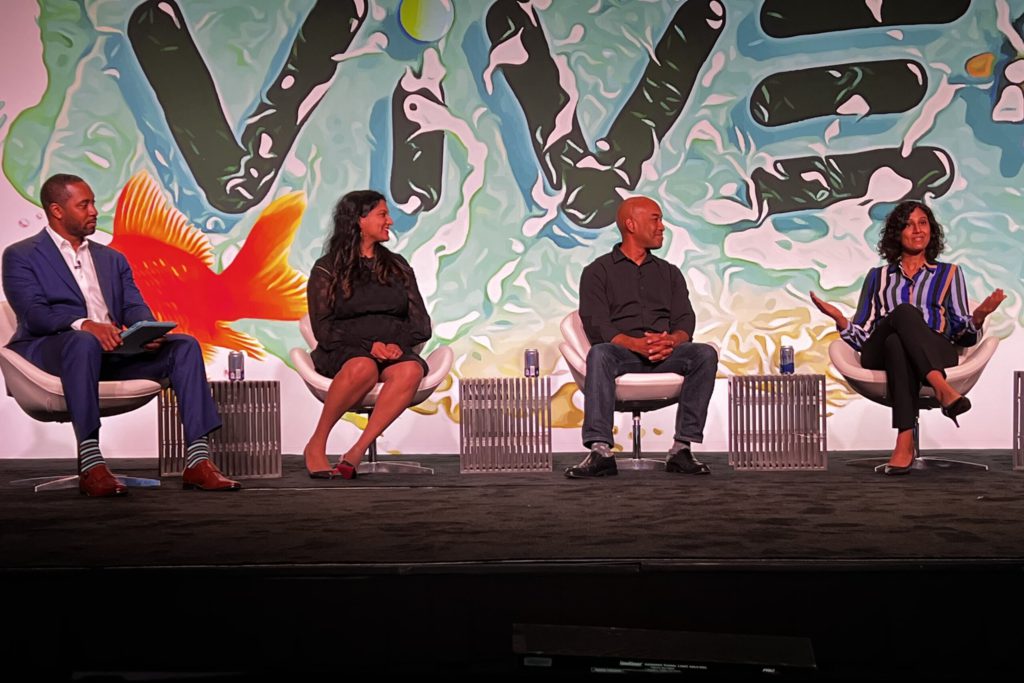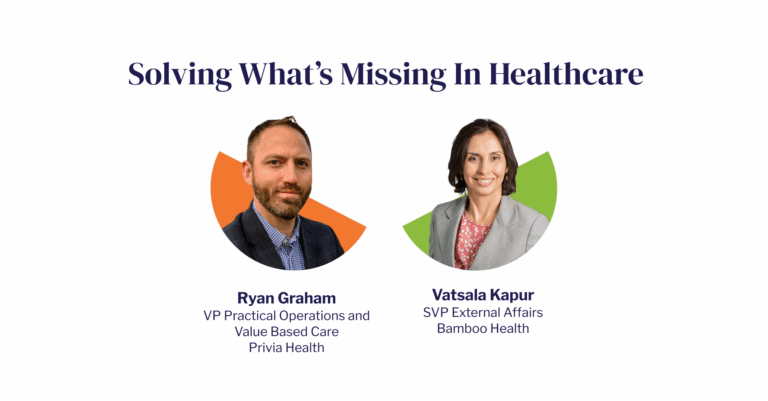Behavioral health and technology took the spotlight during a panel presentation at ViVE on Monday, March 7, titled, “Whole Person Care 101: CH. 1 Behavioral Health.” Bamboo Health’s Chief Clinical Officer Dr. Nishi Rawat joined two other panel members – Dr. Nina Vasan, Chief Medical Officer of Real, and Dr. Ian Tong, Chief Medical Officer of Included Health. Marshall E. Jackson, Jr. from McDermott Will & Emery LLP served as moderator.
The panel covered some of the issues that have led to the behavioral health and substance use crisis – with more Americans facing a mental illness while drug overdose deaths surged to 104,000 lives lost in the last year.
Dr. Rawat shared her perspective that stigma has left behavioral health behind and that breaking down those barriers is critical to moving the needle.
“Stigma is driving the lack of access to evidence-based treatment. It’s driving the lack of recognition of evidence-based treatment. We know what works for many mental health conditions. We know what works for opioid use disorder based on three decades worth of research and yet people can’t get access to evidence-based treatment. Stigma drives the lack of payment parity,” said Dr. Rawat. “Behavioral health is woefully behind physical health. When it comes to access to salient data at the point of care, physical health has figured that out for the most part. We’re being inundated with data at the point of care as physicians. Now we’ve moved on to trying to figure out how to make that data usable. We have to work on data connectivity as well as usability in parallel for behavioral health instead of serially, as we did with physical health. And that’s exactly what we’re doing at Bamboo Health right now.”
Dr. Rawat also shared what she believes are the three types of pain that have led to the substance use epidemic: physical, mental, and economic pain.
- Physical: “Prescribing by physicians over the past two decades led to the first wave of the opioid epidemic. Now, we’re doing better. We’re getting tighter, but the pendulum is starting to swing back in that other direction. We have to keep our eye on the ball. We have to make sure that non-opioid pain management mechanisms are available to the masses.”
- Mental: “Prior to the pandemic, 50% of Americans said that they feel alone, that they feel like nobody really understands them in their lives. That’s only been magnified by the pandemic. And we know, there’s been an increase in the prevalence of mental health conditions, depression, anxiety, post-traumatic stress by 30 to 40% in the past 18 months.”
- Economic: “It’s something that we’re not talking enough about. If you speak to political leaders in the Midwest, they will tell you that the opioid epidemic is ravaging their communities because of number one, idle hands, especially among young males, but also this gap between the haves and have nots, the more the doubling of the gap between the people who have something and don’t have something, and the resentment associated with that gap.”
Finally, the panel covered a broad discussion of promising initiatives in the near future and how their companies were doing work to support those efforts. Dr. Rawat highlighted Bamboo Health’s focus to support initiatives around substance use. She shared four pillars for addressing substance use which include: prevention, access to treatment, harm reduction, and recovery support. Bamboo Health has technology solutions to help support the first two categories.
- Prevention: “We are the prescription drug modern program for 45 states. For the prescribers out there, when you’re about to prescribe a controlled substance, you check the prescription drug monitoring program (PDMP). We provide software that tells you whether or not the person in front of you has been prescribed or dispensed a controlled substance in the recent past. In the states where checking the PDMP system is mandated, which is about two dozen states, they’ve seen a reduction in opioid prescribing and dispensations, and increased use of non-opioid alternatives for pain management. Finally, they also have a reduction in deaths related to opioids with the exception of fentanyl. This is over an eight-year period. So, that’s fantastic. That shows you the power of technology to prevent.”
- Access to treatment: “We also are very much focused on treatment. We work with 14 states right now with our OpenBeds system. What we do is essentially create a digital village. These are vexing problems, right? It takes a village, it takes multiple stakeholders across the private sector, the public sector. What Bamboo Health does is bring all of these stakeholders together on this one technology system, so that those who refer into mental health and substance use disorder treatment, they can see the availability of services. They have situational awareness. They can use the tool to get decision support as medical clinicians. You can send digital or referrals and do much more.”
- Results: “We closely track the people who are being pushed through the cracks, and we report on those data out to the county, the local organizations. In the State in Delaware, we average 800 to 900 referrals per week. When we launched in 2018, there were 200 to 300, and now we see 800 to 900 referrals. We know more people are accessing care, and Delaware is actually one of three states that saw a decrease in their opioid overdose deaths by 7%. Across the US, they went up by 16%. The Lieutenant Governor and the state credit the increase in access to care and decrease in overdose deaths to our system. That’s the power of technology to bring people together. There is still lots of work to do, but the challenges are not insurmountable.”



